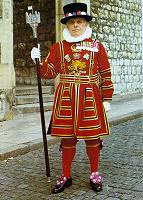London Life and Travel Tips
(London, England, UK)

About the British
Good manners are welcome everywhere and expected by most people. The British are quite tolerant of most things, but visitors are expected to abide by certain codes of behaviour and general etiquette. These include standing in line, waiting your turn, avoiding barging, shoving and general confrontation.
In public places, such as trains and buses, the British tend to speak quietly and generally consider shouting and speaking loudly in these situations to be offensive. The British expect their privacy to be respected and simple things like apologising if you bump into someone is greatly appreciated and the gesture is usually returned.
Language
English is the most commonly spoken language in the United Kingdom, although regional dialects can vary greatly. There are countless ways to say the same thing in the English language, so, in most cases, don't worry about trying to think of an alternative.
Tipping
Tipping is quite discretionary, with taxi drivers usually being given a 10% gratuity or thereabouts - although this is not essential. Restaurants often include service charges and these are always clearly stated on the menus, otherwise a gratuity of around 10% is usually expected in recognition of prompt and courteous service. Hotel staff, such as luggage handlers, happily accept a tip of one or two pounds. Generally, no other public service workers expect tips.
Places of Worship
Churches in London mainly belong to the Church of England as places of worship for the Anglican faith, although all faiths are always welcome. However, this cosmopolitan city also has many mosques, temples and chapels and most other religions are well represented.
Smoking
In most buildings and on public transport, rules restrict smoking and this is usually indicated by no-smoking symbols in prominent places. Following the introduction of a new English smoking law in July 2007, smoking inside pubs and bars is no longer permitted, although many tend to cater for smokers in outside areas.
Smoking in Britain is not as fashionable as it once was, so it is always worth exercising discretion and sensitivity when selecting a place in which to smoke. The best advice would be not to smoke unless others around you do so.
Invitations to Eat
Much business is done over the dinner table and business lunches will frequently take place at a local restaurant recommended by your host. In most good restaurants there will be a comprehensive wine / beer list and tables usually need to be booked in advance. Business dinners are often also conducted at home and these tend to be less formal affairs, with a pre-arranged time for arrival about half an hour before dinner is served. Although guests are not expected to arrive bearing gifts, a bottle of wine or flowers are very much appreciated and should be presented upon arrival. Social dinners are rarely formal affairs and guests will be encouraged to relax.
Social Drinking
The British love pubs for their informality and social atmosphere. They are most often places to meet and be seen, though each has its own standing in the local community, with some being frequented by business people, locals, celebrities and others by visitors and tourists. Most pubs are friendly places - if there is a good mix of people you can be sure that it is a good pub, otherwise, just close the door and find another nearby.
One of the most common social customs associated with drinking in pubs is that of buying a 'round' of drinks when drinking socially with a group. Members of the group take their turn, in no particular order, and as people's glasses empty it is a good idea to reciprocate and offer to buy the next round. Wine bars have also become very popular in London as the British thoroughly enjoy drinking and talking about wine.
The belief that the British drink nothing but tea is today very much a myth. Many love drinking coffee, especially from the countless popular coffee shops in the city that have opened in recent years.
